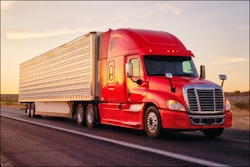Many drivers will receive higher per-mile pay in 2005, according to an online survey sponsored by Rand McNally. A survey of 424 trucking professionals conducted by The Litchfield Group found more than 20 percent of trucking companies plan to increase their per-mile pay for driving through congested areas this year. Forty-six percent of managers, however, do not plan any pay increase in 2005.
Transport Capital Partners has been formed through a merger of transportation services firm Transport Capital Advisors and mergers and acquisitions firm Larsen, Batts, Welborn & Co. The new company will focus on merger and acquisition services, capital sourcing and financial advisory services.
Rep. Collin Peterson (D-Minn.) introduced legislation (H.R. 1255) to extend tax incentives for biodiesel.
Frozen Food Express Industries reported that its net income for 2004 was up more than 150 percent from 2003 to $10.8 million on revenues that were 12.4 percent higher than the prior year. Only in 1994 did the carrier have a higher net income in its 59-year history.
Overnite Corp. reported that its operating revenue for the fourth quarter of 2004 was a record $421.4 million, up 11.4 percent from the same 2003 period.
Knight Transportation said that its 2004 revenue was up 30.1 percent to $442.3 million and that net income increased 35 percent to $47.9 million.
What does the overall financial health of the United States mean to you? A recent speech at the University of Alabama’s school of business by the nation’s chief accountability watchdog tried to tackle that very question. And the answers offered by David Walker, comptroller general of the United States, are unsettling.
As head of the U.S. Government Accountability Office, Walker has unusual freedom to be honest. He serves under a single 15-year term and has the directive to “tell it like it is” without fear of what either Democrats or Republicans would say. But he’s got plenty to say about them both.
Why should you care? These issues affect you as an individual, parent or grandparent. But they also affect your business. In a nutshell, our nation’s finances will affect the future direction of interest rates and thus manufacturing activity, which of course is related directly to shipping volumes. Things are pretty good today, but for the long term, there are certainly some pretty serious storm clouds on the horizon.
The United States now is almost 230 years old, and no republic has lasted more than 300 years, Walker notes. If America is to break the record, Walker argues that we have work to do, starting with an understanding of where we are and where we are headed.
The realities are daunting, and that contributes to a sense of paralysis. For example, the United States must reform entitlement programs, Walker warns. Sixty-one percent of the federal budget is basically on autopilot, meaning that programs and spending levels are tied to established formulas that ensure that costs escalate over time.
The national debt – which Walker defines as the sum of liabilities and unfunded commitments – stands at $350,000 for each full-time worker, he says. Surprisingly, Walker lays the blame squarely on the last decade despite the conventional wisdom that it was a period of fiscal responsibility. Walker charges that we unwisely allowed spending in the 1990s to rise to meet the higher-than-average tax receipts that resulted from the stock market boom. Yes, there were surpluses, but when the equities markets tanked, so did tax receipts.
Also contributing to deficits are the tax breaks that were used to stimulate a sluggish economy in the past few years. Walker believes the budgeting process must change. It is simply too easy to enact a program or tax break that is focused on short-term benefits, he says. To be effective, budget initiatives must consider the decades-long impact, affordability and sustainability of proposals.
Consider the burden on the next generation. For many high-income individuals, federal and state taxes claim 23 to 28 percent of their total gross income. Walker contends that based on the current course of America’s finances, our children’s tax burden in 30 years will be more like 50 percent.
These are sobering observations, and we shouldn’t dismiss them as “someone else’s problem.” Our current fiscal course is not sustainable – and the day of reckoning is coming if we don’t mend our ways.
Resources
“Saving our Nation’s Future: An Intergovernmental Challenge,” speech by David Walker, comptroller general of the United States to The National Press Club, Feb. 2, 2005 (www.gao.gov/cghome/intergovchallenge.pdf)
“21st Century Challenges: Re-examining the Base of the Federal Government” by the Government Accountability Office, summary at this site and full 96-page report at this site.
Certain truck bodies exempt from tax
The Internal Revenue Service last month declared that four types of truck bodies are excluded from the federal excise tax on heavy trucks. The excise tax does not apply to truck bodies and chassis suitable for use with vehicles that have a gross vehicle weight of 33,000 pounds or less. But retailers sometimes don’t know the gross vehicle weight of the vehicle on which the body is to be mounted.
In guidance issued March 15, the IRS said that the following classes of truck bodies are to be excluded from the retail excise tax, effective April 4:
- Platform truck bodies 21 feet or less in length;
- Dry freight and refrigerated truck van bodies 24 feet or less in length;
- Dump truck bodies with load capacities of eight cubic yards or less; and
- Refuse packer truck bodies with load capacities of 20 cubic yards or less.
A copy of Revenue Procedure 2005-19 is available at this site.










